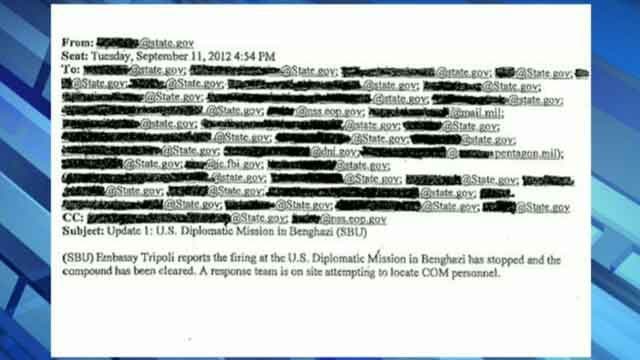Fox News
Though social media was vital in driving -- and monitoring -- the so-called Arab Spring that overthrew longtime dictators in Libya and other countries, Clinton dismissed it as an unreliable source after a series of internal emails sent by Clinton's State Department staff surfaced in which officials reported within hours of the attack that militant group Ansar al-Sharia claimed responsibility in Internet postings.
"Posting something on Facebook is not in and of itself evidence," Clinton said. "And I think it just underscores how fluid the reporting was at the time and continued for some time to be."
She suggested those producing the emails were "cherrypicking" documentation, as the White House noted the organization reportedly had denied responsibility in other settings.
"I think within a few hours that organization itself claimed that it had not been responsible. Neither should be taken as fact," White House Press Secretary Jay Carney said.
But the group is a prime suspect. Indeed, one suspect in custody in Tunisia is a member of Ansar al-Sharia, one lawmaker told Fox News.
Three Republican senators, in a letter Wednesday to the White House, said they were "disturbed" by the latest email revelations, claiming it "adds to the confusion" about what the administration knew of the attacks.
"In television interviews nearly a week after the events in Benghazi, you yourself even refused to describe it as a terrorist attack, instead emphasizing the role played by a hateful video. This concerted misrepresentation of the facts of the case -- facts that, it appears, you and your administration possessed almost as soon as the attack began -- is why so many of our constituents are demanding a fuller explanation of why your administration responded as it did," wrote Sens. Lindsey Graham, R-S.C.; John McCain, R-Ariz.; and Kelly Ayotte, R-N.H. They called on the president to "address the American people directly" on what happened.
Though the emails, obtained by Fox News on Tuesday, are just one piece of the puzzle, they reveal some of the most detailed information yet about what officials knew in the initial hours after the attack. And they again raise questions about why U.S. Ambassador to the U.N. Susan Rice, apparently based on intelligence assessments, would claim five days after the attack that it was a "spontaneous" reaction to protests over an anti-Islam film.
Ansar al-Sharia is a group in eastern Libya that sympathizes with Al Qaeda. A member of the group suspected of participating in the Sept. 11 attack in Benghazi has been arrested and is being held in Tunisia.
The emails obtained by Fox News were sent by the State Department to a variety of national security platforms, whose addresses have been redacted, including the White House Situation Room, the Pentagon, the FBI and the Director of National Intelligence.
Fox News was told that an estimated 300 to 400 national security figures received these emails in real time almost as the raid was playing out and concluding. People who received these emails work directly under the nation's top national security, military and diplomatic officials, Fox News was told.
The timestamps on the emails are all Eastern Time and often include the subheading SBU, which is shorthand for "Sensitive But Unclassified."
The third email came at 6:07 p.m. ET and was sent to a different email list but still includes the White House Situation Room address and a subject line of "Update 2: Ansar al-Sharia Claims Responsibility for Benghazi Attack (SBU)."
"Embassy Tripoli reports the group claimed responsibility on Facebook and Twitter and has called for an attack on Embassy Tripoli," the email reads.
Earlier emails did not go into who might have been responsible for the attack.
The first email indicates that U.S. Ambassador Chris Stevens and other personnel were "in the compound safe haven." Officials later discovered that Stevens and three other Americans had died in the attack.
The first email was sent at 4:05 p.m. ET with the subject line: "U.S. Diplomatic Mission in Benghazi Under Attack (SBU)."
"The Regional Security Officer reports the diplomatic mission is under attack," the email reads. "Embassy Tripoli reports approximately 20 armed people fired shots; explosions have been heard as well. Ambassador Stevens, who is currently in Benghazi, and four COM personnel are in the compound safe haven. The 17th of February militia is providing security support.
"The operations Center will provide updates as available."
The second email came at 4:54 p.m. ET, with a subject line: "Update 1: U.S. Diplomatic Mission in Benghazi (SBU)"
"Embassy Tripoli reports the firing at the U.S. Diplomatic Mission in Benghazi has stopped and the compound has been cleared. A response team is on site attempting to locate COM personnel."
The emails on the day of the attack further challenge not only the initial statements made by administration officials like Rice about the strike, but also recent claims that they were only basing those statements on the intelligence they had at the time.
State Department official Patrick Kennedy recently testified to Congress that anyone in Rice's position would have made the same statements about the attack being spontaneous.
But the newly uncovered emails clearly state the involvement of a militant group whose agenda is to establish an Islamic state in eastern Libya.
Despite this, White House Press Secretary Jay Carney backed up Rice on Sept. 18. He said: "Based on information that we -- our initial information ... we saw no evidence to back up claims by others that this was a preplanned or premeditated attack; that we saw evidence that it was sparked by the reaction to this video." Carney went on to say "that is what we know" based on "concrete evidence, not supposition."

No comments:
Post a Comment